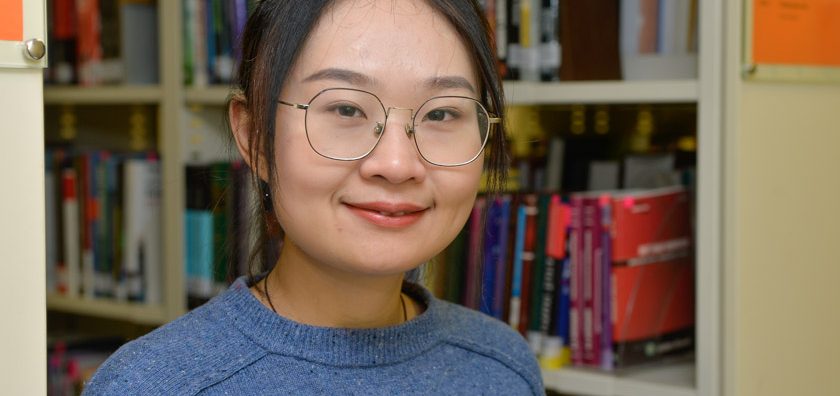
In Vilnius everything – from theater to cinema, from food to bookstores, ballet and even buildings - is of interest to 28-year-old doctoral student Siqi Yang from China’s Beijing Normal University.
She is writing her PhD thesis and conducting research at Mykolas Romeris University’s Environmental Management LAB. But aside from her research and studies, she finds time to attend the Jaunimo Teatras to see a play in Lithuanian (with English subtitles) or to see a ballet at the Vilnius Opera House.
Why Lithuania? How did it happen that you came to Vilnius?
There is a Portuguese professor at MRU that is well known in China – Paulo Pereira. He is very popular at my University. Chinese students come from far-off rural cities to listen to his lectures and pack the auditorium. His topic, ecosystem services, is interesting for many Chinese students. Also, he teaches a workshop on how to write research papers to meet the standards of editors. I met him in China this past May and attended his lectures. We talked and in the end, I came to Vilnius. I am working on my PhD and conducting research here.
What type of research?
I am interested in the quality of the fresh water supply in rural China. I am investigating the amount of nitrogen and phosphorus elements in the soil linked to the water supplies. This is important because in recent years soil conservation is increasing. But, the amount of water is decreasing and the water purification is increasing. I want to find out what factors cause this situation.
What did you know about Lithuania before you came?
Well, I had to find out much before I came. I saw a Google Map on the Internet and read up on the country. I found out about your long, cold winters. There is snow in Beijing, but the snow is different. But that is just a small observation of mine.
You have a wide range of interests aside from research. You enjoy theater, cinema, attending ballet performances. Is it difficult to find time for everything?
When you work much, it is good to get to explore a city and find time to think. In China I have a lot of work, research and many friends. Here I am alone so there is more time to spend time in city. I like to go see films. I have already seen a play, “Hunger Artist” at the Vilnius Jaunimo Teatras, which I enjoyed. I am also planning to see a ballet at the Vilnius Opera House, Eglė Žalčių karalienė (Grass Snake Queen Eglė). There is so much to see and do in Vilnius.
What do you think of Chinese food in Vilnius?
It is different from China. Here Chinese food is modified for Western taste and not that spicy. I like spicy food more. So I can tell you the Chinese food is not really Chinese here. Also, many students, even myself, like to cook. In my dormitory in China, students don’t cook together as they do at the MRU dorm. We don’t have a joint kitchen. In China we eat in the cafeteria or go out to eat. Here, I cook for myself. But, there have been occasions here when students come together from different countries to cook national dishes for other students to taste. Recently we had a gathering where students from Taiwan, Croatia, Portugal, Italy, Estonia were all cooking something from their country for others to try. It was fun.
What do you think of Lithuanian food? Have you tried the pink soup?
I like the food here. It is ok. I especially like the pancakes, the crepes – lietiniai. I noticed that chocolates are cheaper here than in China. Also, coffee beans here are of a better quality and much cheaper than in China. I enjoy the coffee here in Vilnius. It is good.
So what is cheaper and better in China?
The tea, of course, Also, if you want to taste authentic Chinese food – even Beijing Duck, you must go to China. Here Chinese food is modified for Western tastes.
What are the differences that you noticed between Beijing and Vilnius?
I noticed there is no sunshine here during the fall and winter months. Also, there are less people on the street here. You do not have any restrictions on what days you can drive. In China, we have odd-day and even-days for drivers – depending on their license plates. Due to the huge amount of cars, the government restricts driving on certain days for certain vehicles to reduce traffic congestion. However, I do find that researchers’ thinking is the same – whether in China or in Lithuania.
Do you have different styles of working in China and here?
Yes, in China my supervisor asks me to do some work on the weekend. Here the supervisor gives you the weekend off and you have more free time. I also like the MRU Library, where I feel very relaxed. It is an open space that is open late into the night so students can study more comfortably and when they want. You know, in China, there are so many people in the Library, so it’s sometimes hard to study and concentrate. Nevertheless, the majority of my time is spent studying here and at home.
What do you plan to do after you get your PhD?
I am not sure yet. It depends on the opportunities that come along at that time. There is a lot of competition at the university in China. I hope to get a job in my field.
When will you return to China?
I am here for a 10-month period and will stay until next year. Being in Vilnius is a new chance for my future. I plan to learn as much as I can. I want to see as much as I can of Vilnius and Lithuania, while I am here too.